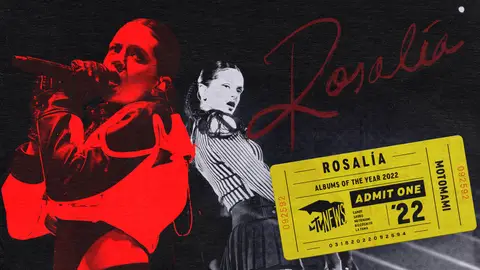Albums Of The Year: Rosalía's Every Little Sound Is Music On 'Motomami'

This is the fourth of five essays MTV News will publish this week honoring our 2022 Albums of the Year. See the first, second, and third.
A few seconds into Motomami, on a reggaeton-inspired track named “Saoko,” Rosalía asks herself: Chica, ¿qué dices? (“Girl, what are you saying?”) It’s a question that shocks the spirit back to life, immediately opening Rosalía up to liberation and freeing her from the burden of meaning — all while she giggles sporadically across the track. After a very impromptu jazz fill and a callback to Daddy Yankee and Wisin (“saoko, papi, saoko”), you may find yourself echoing the question back to her: Girl, what are you saying? But it doesn’t matter. Words are for nerds. Motomami is for shits and giggles.
Rosalía’s immediate decision to throw logic out the window sets us up for Motomami’s enormous sense of fun, as well as its anarchic relationship with language. On her third album, Rosalía doesn’t use words semantically, but percussively. She privileges intonation and timbre over elocution, so that every little thing is music. “Pa' ti naki, chicken teriyaki / Tu gata quiere maki, mi gata en Kawasaki,” she sings on “Chicken Teriyaki.” Why? Because its consonants sound like kick-snares. Because it’s fun. Because it sounds good.
Just like the portmanteau “Motomami,” which sounds like the name of a perfume, the words on the album tend to function like superficially evocative signifiers. They’re a vibe. An essence. A spirit. A scent. If you wanted to find an entry point into the album, your best bet is not opening up Genius and hunkering down with the lyrics. Instead, in order to understand the intention of a song on Motomami, you must simply feel its energy. Don’t the machine-gun drums on “Cuuuuuuuuuute” make you want to gyrate? Don’t her desperate, breathy vocals on “G3 N15” make you want to cry? Doesn't the deranged chiptune on “Bizcochito” make you want to say, girl, what the fuck are you playing at? Like a sonic lobotomy, it takes a hell of a lot of thought to make something this thoughtless. And Motomami is an extremely artful and cerebral ode to the nonsensical.
Prior to this moment, we knew Rosalía was very, very smart, well read, well educated, and extremely well versed in both classical and popular music. We hadn't yet learned about her capacity for fun and her appreciation for the senseless. She came to international prominence in 2018 with the release of her second album, El Mal Querer, in 2018, originally a graduate thesis based on the 13th century novel The Story of Flamenca, which she first presented at the Catalonia College of Music. On it, she hid Rosalía the persona behind narratives and characters while forming a niche for herself somewhere just below the mainstream with her distinctive flamenco fusion aesthetic. As a white woman from a town close to Barcelona — an area culturally and geographically removed from the Andalusia region that birthed flamenco — Rosalía’s ascent to fame was clouded by claims she was centering whiteness in a genre historically performed and practiced by people of color. Those claims ultimately provided a valuable opening for discourse, giving us the opportunity to ask some challenging questions: How do we find the line between commercial exploitation and artistic innovation? On one hand, we might say that Rosalía’s globalism may not be so global, but rather self-serving. On the other, more generous hand, we might say that, well, she’s a collagist, not a moralist.
As a collagist, Rosalía is top of the class. Motomami is an artfully crafted jumble of flamenco, bachata, reggaeton, dembow, bolero, samba, and synthpop. It’s a combination that — like strawberry, basil, and balsamic vinegar — shouldn’t work but somehow really, really does. It’s an extremely minimalist approach to assemblage. Most of the songs are only made of a few components: usually some aggressively distorted drums, her melismatic voice — which she regularly chops up and turns into a synth riff — as well as the occasional piano. She strips until she’s left with nothing but the song’s naked essence. On “Chicken Teriyaki,” the album’s most scaled-back track, Rosalía quite literally plays one note throughout the whole song, yet her pared-down approach still sounds enormous. Her voice floods everything.
Motomami’s somber and sentimental moments — “G3 N15,” a paralyzingly beautiful ballad which ends in a voice recording from Rosalía’s grandmother — are the album’s outliers. Rosalia’s general approach on Motomami is to reveal essence via nonsense. She treats the heaviest of subjects — life, love, death— with lightness and whimsical chaos. She grants her silliest, most hedonistic ideas the greatest drama and sincerity. On “Hentai,” for instance, she sings about exactly that (anime porn) over Disney-like keys with enormous chord intervals. Everything is fun, fleeting, and brilliant, before it’s hysterically sincere.
“Sakura,” a song that sounds like a Rosalía comeback tour from far-off in the future, marks the album’s end and seems to reveal the purpose behind Motomami’s gleeful chaos. “No pa' siempre puedes ser una estrella y brillar / Voy a reírme cuando tenga 80 y mire pa' atrás,” she sings (“You can’t forever be a star and shine / I’m gonna laugh when I’m 80 and look back”). Chica, ¿qué dices? She’s saying that everything — love, fame, being alive — is fleeting. That words are there to burn. That we should honor the ephemeral by laughing through it. “Las llamas son bonitas porque no tienen orden / Y el fuego es bonito porque todo lo rompe,” she signs off (“Flames are beautiful because they’re not afraid to burn / And fire is beautiful because it breaks everything”). The words seem to last forever, until they don’t.
See MTV News's other 2022 Albums of the Year:





